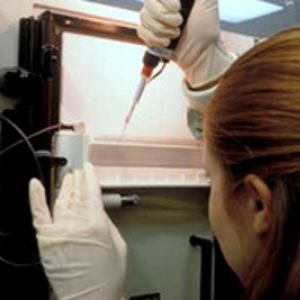Genetic Testing

In recent years, accurate testing for the mutation in the RB1 gene that causes retinoblastoma has become possible. The mutation is discovered in approximately 80 to 90% of children with Bilateral Sporadic and Familial RB who are tested.
If the mutation is discovered in a patient with Unilateral or Bilateral Sporadic RB or in any member of a family who has Familial RB, then the same mutation can be searched for in other family members who are at risk of RB:
If the same mutation is not found in a particular family member, then that person is not at risk of RB and will not need to undergo regular screening with EUAs. This provides an enormous emotional relief for these families, particularly if there are a number of family members that are currently having EUAs. In many cases, families who do not have to attend for regular EUAs are also relieved of a large financial burden which far outweighs the cost of the test.
If the same mutation is found in a particular family member, then that child has a very high risk of developing RB. A positive test result will allow your eye doctor to watch that child very closely for the development of tumours in the eyes, and to treat the tumours early whilst they are still small. This will allow the best chance of saving their vision, saving their eye(s) and saving their life.
If the mutation is not found in a patient with RB, then the ‘at risk’ family members will need to continue with regular screening with EUAs as outlined in the section on Familial RB.
Genetic Counselling
It is vital that all discussion regarding the genetic basis of RB and the need for screening of family members, whether by EUAs or genetic testing, is carried out in conjunction with a doctor who specialises in the treatment of genetic diseases (clinical geneticist). Your general practitioner or eye doctor will be able to put you in contact with a clinical geneticist in your area.
In South Australia, genetic counselling is available through the Familial Cancer Unit at the Women’s and Children’s Hospital in Adelaide:
Tel: 0061 – 8 – 8161 7375
Fax: 0061 – 8 – 8161 6088
E-mail: sacgs@mail.wch.sa.gov.au
The Testing Procedure
Blood for testing is usually taken from your child at one of the follow up EUAs, but only after you have consulted the clinical geneticist and given your consent to proceed with the tests. In older patients or at-risk family members, blood can be taken at the time of consultation with your clinical geneticist.
The blood sample is passed through a number of tests in order to identify the mutation. These might include DNA Sequencing, Fluorescence in situ Hybridisation (FISH), and Fluorescent PCR Multiplex Analysis. The entire process is very time consuming and it may take several months before an answer is available. Your clinical geneticist will contact you for an appointment to discuss the test results as soon as it is known.
When a tumour sample is available in patients with unilateral RB who have had enucleation, the tests might include DNA Sequencing, Promoter Hypermethylation Studies, and Loss of Heterozygosity Analysis.
Once the mutation has been identified, testing of other family members takes approximately one month each.
Contact
Please contact Ms Jacqueline Carroll at the Institute of Medical and Veterinary Science in Adelaide, Australia for costs and technical information regarding genetic testing in RB:
Tel: 0061 – 8 – 8222 3895
Fax: 0061 – 8 – 8222 3146
E-mail: jacqueline.carroll@imvs.sa.gov.au
You can also visit the link to our service on the Gene Tests website at www.genetests.org
